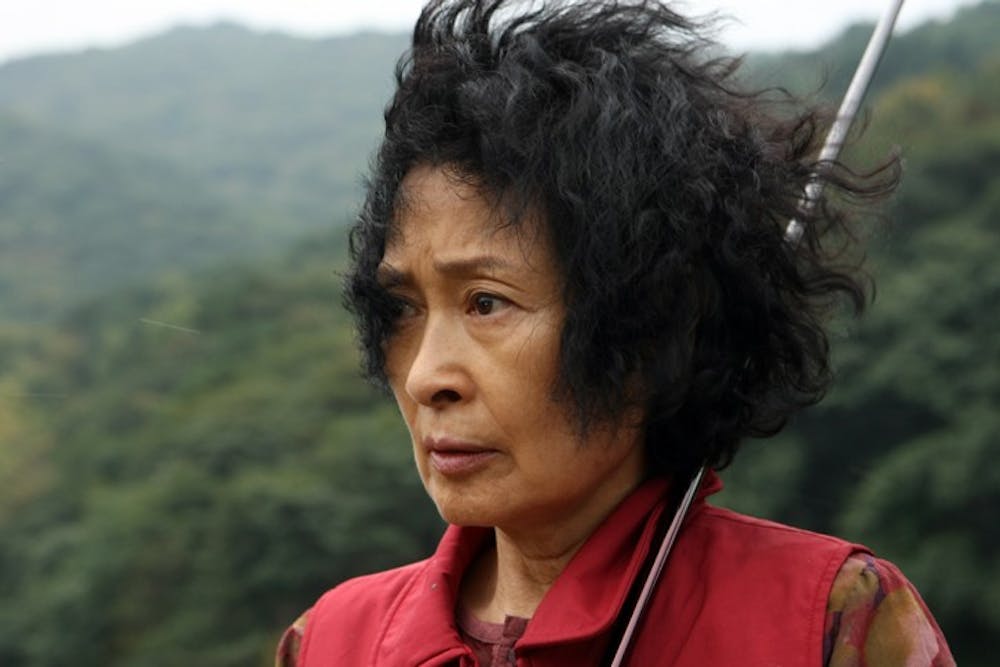Mother Grade: A
If it is true that the mother-son bond is something that can withstand even the most insufferable of hardships, then the new South Korean film “Mother” pushes that idea to the brink of torment.
“Mother” is the chilling new dramatic thriller by Bong Joon-Ho, a director who is no stranger to the grotesque and unnerving. It follows the two-member family of Do-Joon (Won Bin), a 27-year-old who lives with his presumably widowed mother, Hye-Ja (Kim Hye-Ja). Do-Joon is ill-adapted to daily life and seems to be mentally impaired. When he is arrested for being implicated in the murder of a high school girl, it’s up to his mother to prove his innocence by any means necessary.
“It’s Kim Hye-Ja, the leading role, who inspired me more than anything,” Joon-Ho said in an interview with The Eagle. “She is an iconic figure in Korea, and she’s always played that kind-hearted, loving mother, so I wanted to bring out the different sides to her.”
The film is told from the unreliable perspective of Hye-Ja. While it’s unclear to both the viewer and the unwitting Do-Joon himself what exactly happened on the night of the murder, there are heavy implications to suggest that he is indeed innocent. But as the story unravels its bizarre and shocking layers, there’s an underlying sense of guilt that comes with wanting to defend her son.
“Unlike [Kim Hye-Ja’s] previous images, I saw a sort of darkness,” Joon-Ho said. “And I really wanted to portray that unstable darkness that only a mother could, and more specifically, how far a mother would go to save her son.”
The viewer is spared no whit of modesty, as nothing seems too defiant a task for Hye-Ja. After knowledge of the murder goes public, she becomes the town pariah.
There’s an artful approach to the storytelling; the viewer is treated to a number of side-stories and classic characters that are common in the Korean lower class. The film’s details suggest how far removed the town is from normalcy in law and order, at least by Western standards.
Joon-Ho said he likes to test the limits of his characters by stretching their willpower way past the threshold of decency.
He has a penchant for incorporating those of the weak and helpless variety because he finds that aspect endearing, a theme in his work he reminisces about fondly.
“I remember, growing up, there was this one boy who was mentally challenged in our neighborhood,” he said. “He was always the most popular kid because he was so funny. My characters tend to be very weak and helpless because they usually end up being the accused or blamed for whatever crime they didn’t commit.”
Back in South Korea, Joon-Ho is a cultural icon with an impressive filmography. He gained widespread acclaim in 2003 for his film “Memories of Murder,” a disturbing detective story based on true events which gives the viewer “an insight or perspective on Korean society in the 1980s,” according to Joon-Ho. In 2006, he directed “The Host,” a monster movie that is equal parts slapstick comedy, nerve-wracking horror and political satire. It won awards worldwide and remains the highest grossing South Korean film of all time.
Taking a subtler, more personal approach to filmmaking, Joon-Ho was at an ends with “Mother,” and any obstacles he faced during production were internal.
“It was a totally different genre and something I’ve never actually worked with before,” he said. “[It’s not like my other films where] you see all these outside forces and factors that you can put your finger on to blame.”
If this film serves as any indication, Joon-Ho has a versatile gift for direction that can only be marred by cultural gaps. His hairline precision for suspenseful build-up and seamlessly natural plot progression give him a distinct style. Truly, he sets a remarkable benchmark for the humble Korean film industry.
“I’m hoping audiences will substitute or try to think of what their own mothers would do in this situation,” he said. After a screening in New York, Joon-Ho said he received a letter from a young man who shared his own personal stories with his own mother in response to the film.
“I still have the letter, and that was very impressive, but [I should say that] my own mother is nothing like the one in the movie,” he said, laughing.
You can reach this writer at thescene@theeagleonline.com.





